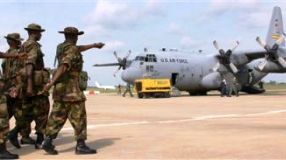African Union officials recommend doubling Darfur forces
By ANTHONY MITCHELL
ADDIS ABABA, Ethiopia (AP) — African Union officials recommended doubling the number of peacekeepers in Sudan’s western Darfur region and giving them a stronger mandate to deal with the violence that persists there despite international condemnation.

|
|
Nigerian troops head to a U.S. C-130 for transport into the Darfur region of Sudan in Abuga, Nigeria, Thursday, Oct. 28, 2004. |
The A.U. Peace and Security Council of the 53-nation bloc was expected to agree late Thursday to double the number of troops authorized for Darfur to more than 6,000 peacekeepers and order them to intervene if they witness any human rights violations.
The A.U. currently has 2,200 troops in Darfur, 1,000 short of the current authorized total. African leaders say they need more logistical support from rich countries in order to deploy more troops.
Assane Ba, spokesman for the A.U., told The Associated Press that the current force is “extremely stretched” and can’t fulfill its current mandate.
“This meeting is about strengthening the force,” Ba said. “We are also looking at a more robust mandate.”
The force currently has orders to monitor a shaky cease-fire signed just more than a year ago, with only limited powers to protect civilians if they are attacked. But the A.U. wants to ensure that its troops can intervene to protect civilians from violence that already has killed tens of thousands of people.
An internal assessment of the mission said it needs 5,887, troops on the ground in addition to 1,560 civilian police by August. It added that it may need to quadruple the force to 12,300 to restore order in Darfur.
Jan Pronk, the U.N special representative for Sudan , also was expected to attend the meeting at the A.U. headquarters in Addis Ababa, along with the A.U.’s force commander Nigerian General Festus Okonkwo.
Ba said officials were likely to discuss the newly announced talks with the North Atlantic Treaty Organization on possible logistical support in what could be the transatlantic alliance’s first mission in Africa. He said the A.U. force needs support in areas such as communications and transporting troops.
The Darfur conflict surged in February 2003 after rebels took up arms, complaining of discrimination by Sudan ‘s Arab-dominated government. The government is accused of responding by backing a scorched-earth counterinsurgency by Arab militias, known as the Janjaweed.
War-induced hunger and disease has killed more than 180,000 people, according to U.N. estimates.
Peace talks, which broke down at the beginning of the year between the Sudanese government and the rebels are expected to resume in May. At least 2 million have been made homeless by the conflict. No firm estimates of the number killed in fighting exists.
